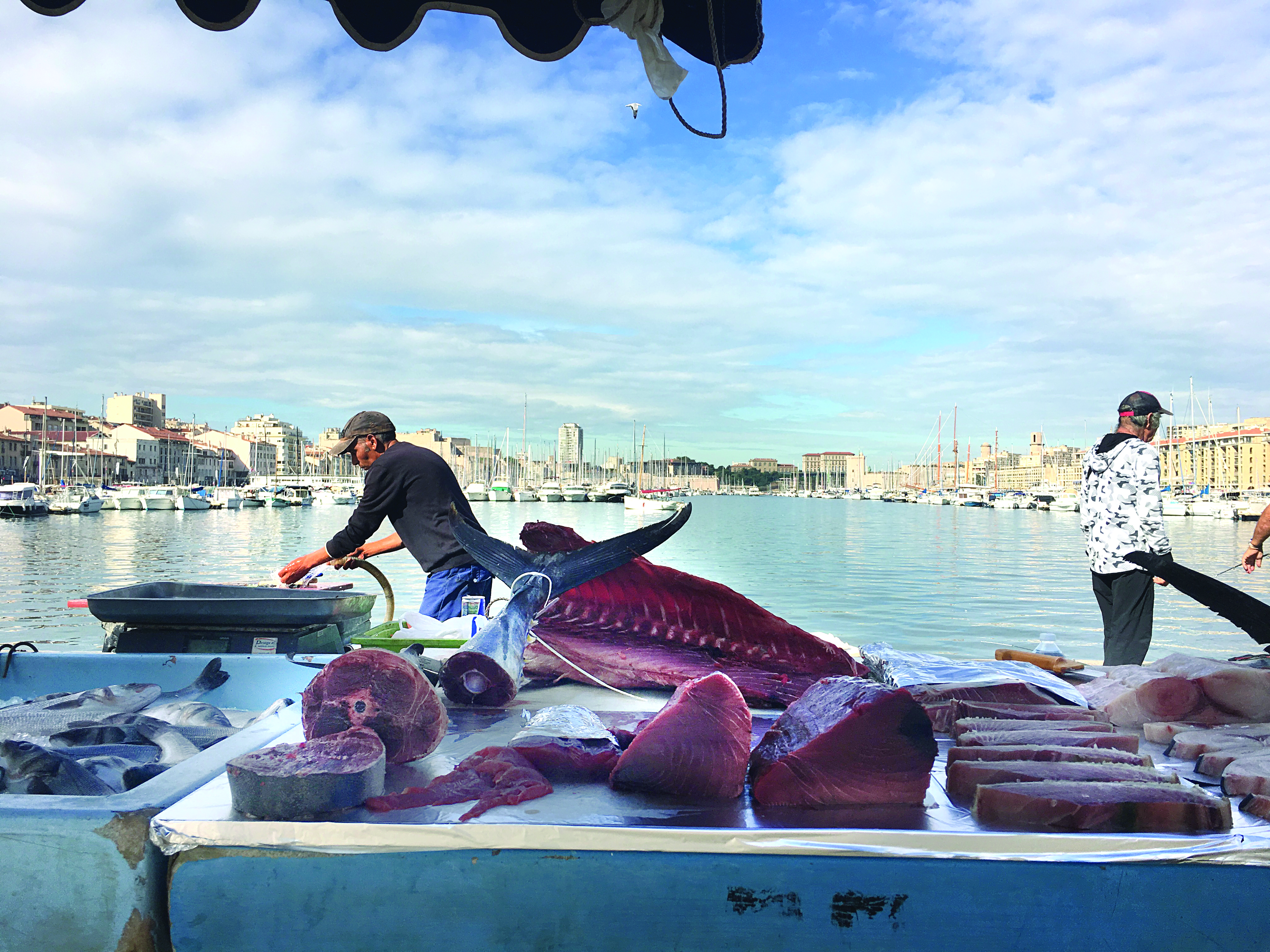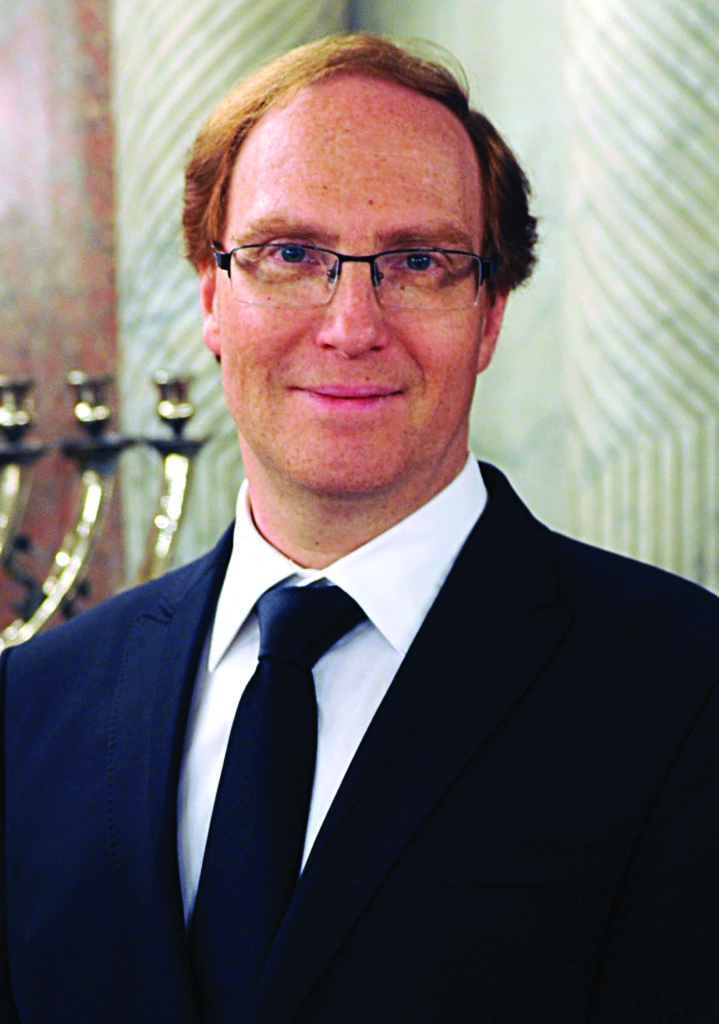 Marseille port. Photo by Orit Arfa
Marseille port. Photo by Orit Arfa You can measure the safety of a Jewish community in Europe by the Jewish-star barometer: How safe do Jews feel walking around with a Star of David pendant? For the 80,000 Jews of Marseille, France — the third largest Jewish community in Europe after London and Paris — the Jewish-star index depends on your city coordinates.
“Go further north, and I would take it off,” warned my host, Nathan Peres, an Israeli-German completing his doctorate at the Sorbonne on the Jews of Lebanon. He chose Marseille over Paris largely for the laid-back atmosphere, the Mediterranean vibe (like Israel’s), and affordable prices — at least compared to Paris.
He likens Marseille’s cost of living to that of Berlin, a hotspot for Israelis. But don’t expect to find a thriving Israeli scene here. Only until 2013, when UNESCO proclaimed Marseille a “European City of Culture,” did France’s second-largest city come into its own as a tourist attraction. Jewish tourists usually opt for Nice and Cannes. (The Chabad of Marseille doesn’t hold communal Shabbat dinners for international young professionals, much to Peres’ dismay.)
“But in the city center, you could wear your star,” Peres said. And at the colorful, tourist-trap port, the Jewish star index is favorable: about 7.5 on a scale of 10.
With historical pride as one of the world’s oldest cities, founded circa 600 BC, contemporary Marseille is a tough, working-class harbor city — not the French Riviera. Jews work largely as merchants, continuing a tradition that began when they first settled here in the Middle Ages, only to be expelled intermittently until the French Revolution of 1789 granted Jews civil rights throughout France. Before and during the Nazi march into the city in 1942, most Marseille Jews either fled or were murdered.
Wearing a Jewish star had one advantage: it granted me a personal tasting by the owner of a cheese shop, who revealed that he too was a Member of the Tribe. It was a Friday, and he said later he would recite Kiddush with his family only to work the next day, but his non-Jewish colleagues handle the sausage tastings.
The Marseille Jewish community tends to be traditional, although the majority attend French public schools during the week and Hebrew day schools on weekends. A Jewish directory lists 12 Jewish schools and 46 synagogues.
While Marseille made terror-related news twice in recent months (an acid attack struck four Americans students at the train station in September, and two young women were killed in an October stabbing incident), it has, until now, been shielded from the mega-attacks that have hit Paris and Nice.
As we walked through a bustling marketplace, Peres became cautious. Here, where African and Arab merchants sell food, spices and housewares, the Jewish-star index stands roughly at 5, even though a kosher café where espresso goes for one Euro is located a few blocks south, and Marseille is multiethnic in its DNA. The northern suburbs are, for all intents and purposes, the slums, populated mostly by indigent Muslims and gangs. There, the Jewish-star index is under 3, still better than some districts in Paris, where the index can be less than 1.
According to Hagay Sobol, a Jewish lay leader and local politician, Marseille stands a better chance of maintaining and improving Jewish security throughout.
“In the 93rd district of Paris [the northern suburb of Seine-Saint-Denis], you can’t reverse it anymore,” he said from his home apartment where he lives with his Moroccan wife. “We are all immigrants but we are all from Marseilles, and we are all French people, so the contact is easier. There is no class division like in other parts of France. It’s safer.”

With his pale, freckled skin, this physician and professor of medicine is a city rarity as an Ashkenazi Jew — his grandparents came from Poland at the turn of the 20th century. His parents were hidden in French homes, saving them from Hitler’s clutches. Most Marseille Jews hail from North Africa, particularly Algeria, which France declared part of its republic in 1848. The bloody French-Algerian War of 1954-1962 brought Algerian Jews and other French loyalists back to the mainland.
More representative of the demographic is Helene Londner, head of the Jewish welfare association, who came with her family as a child in 1962. Her husband, a dentist, is another of the city’s few Ashkenazim.
“There are anti-Semitic occurrences, but we are in a cosmopolitan place — it’s a port city. There is a feeling of partnership within communities,” Londner said from her apartment, which, like Sobol’s home, is decorated with Judaica on the shelves.
Those occurrences include standard “dirty Jew” slurs and an attack on an elderly Jew about two years ago. Londner’s welfare organization, partially publicly funded, has provided meals to poor Muslim families since kosher suffices for halal. To ease tensions, the Jewish community is arranging a soccer match with the organized Muslim community.
“There is a good atmosphere in Marseille, but if you let radicals take power, everything will change very rapidly,” Sobol said.
By “radicals” he means, in part, those whom Muslim radicals trigger on both the right and the left. Marseillians, like Parisians, generally love Israel and are quick to show up at pro-Israel counterprotests, but the Jewish community in France is not as politically organized as the Jewish community in the United States. There is no French AIPAC, for instance. In the spirit of equality, brotherhood and liberty, French Jews present their case as concerned French citizens and, in Marseille, as concerned Marseillans.
Natives are often proud Marseillans, such as Judith Aziza, a 36-year-old communications manager who completed a doctorate on the modern history of Marseille. Indeed, Marseille didn’t become an official part of France until 1486, so Marseillans traditionally maintain a proud local identity.
“I feel French, I feel from Marseille, and for the moment I want to stay here. I’m happy living here,” Aziza said at a bar in an alleyway of hip nightspots (where the Jewish-star index is 8). “But if you ask a friend of mine, she’ll say, ‘I want to go. I don’t feel safe here.’ ”
For Aziza, a modern golden age for Jews in Marseille has passed.
“Until Charlie Hebdo and until the kosher supermarket attack in Paris, and until the terrorist attack in Toulouse, I felt very secure in Marseille,” Aziza said. “And after that, I changed. Before I had the Star of David around my neck without any problem. I did my doctorate with the star around my neck. When I was in high school, I had a backpack from Jerusalem, and it said ‘Jerusalem’ in big letters and I had no problem. Now I can’t do that. I’d be really afraid.”























 More news and opinions than at a Shabbat dinner, right in your inbox.
More news and opinions than at a Shabbat dinner, right in your inbox.